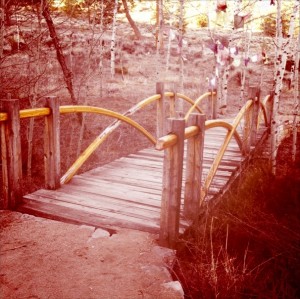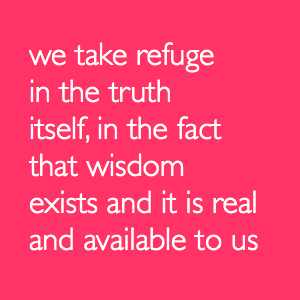Choosing a path: Taking Refuge
April 16, 2012 | 4 CommentsThe Open Heart Project is designed to help you find your unique path with meditation as a support. Whether you are a Christian, Jew, Atheist, or none of the above, meditation provides a powerful foundation from which to explore your world. No one has to be (or pretend to be) a Buddhist to receive this support.
However, sometimes members of the OHP ask me questions about Buddhism, which I love. One of the more regular questions I get is, “What does it mean to become a Buddhist? How do you actually do that?”
When someone decides to become Buddhist, it is called “taking refuge.” (I remember the first time I heard that phrase—more than 15 years ago—and my reaction was to burst into tears. Refuge? There really was such a thing? Bring it.) As it was explained to me, taking refuge is not so much about giving up freedom but about giving up chaos. We spend so much time trying this or that approach to solve our problems and we end up rushing from shiny new possible solution to shiny new possible solution. Committing to the Buddhist path (or any path) means you get to stop running hither and yon. You can relax. There is a Way—however, especially in Buddhism, you are required to bring your own intelligence and personal style into the mix. Yes, the path is 2500 years old and brilliantly laid out, but you still have to make it your own by testing the teachings out against your own experience. What is corroborated, you are invited to keep. What is not, you are invited to leave aside.
There is something very freeing in selecting a proscribed path. It is like finally moving into your own house rather than couch surfing. Sure, there’s a kind of freedom in not having your own domicile, but there’s also a lot of confusion. Your focus has to be on things like, “Where am I sleeping tonight” and “I can’t remember—did I brush my teeth today?” rather than creating your own environment, stabilizing it, and continually beautifying it. When you get your own place, you finally have the freedom to express yourself and build your life as you see fit. Taking refuge, you say to yourself and the world: my home is with the Buddhadharma.
In becoming a Buddhist, you take refuge in three things: the Buddha, the dharma, and the sangha, or community.
Taking refuge in the Buddha is not like taking refuge in a god or in anything outside of yourself. The Buddha was an ordinary being like you and me who was committed to attaining complete enlightenment—and did. We could do this too, exactly as he did. We each have this potential, every single one of us, because we possess this enlightened nature already. So taking refuge in the Buddha, we take refuge in our own brilliance.
Next, we take refuge in the dharma, or the truth. In one sense, we find refuge in the extraordinary and brilliant teachings that have been handed down by the extraordinary and brilliant teachers who have taught Buddhism over the millennia, but beyond this, we take refuge in the truth itself, in the fact that wisdom exists and it is real and available to us.
Finally, we take refuge in the sangha, or community. Usually, when you take refuge it is within a certain community, be it a Zen, Vipassana, Shambhala, Karma Kagyu, or another lineage. There are many. This particular sangha is a refuge because it provides ap place to receive teachings, fellow students to grow and practice with, and encounters both supportive and confusing that serve as a mirror for our growth. However, we also take refuge in the world as our community. We are citizens of planet earth and as such we have a role to play, something to offer, a specific place.
Taking refuge is an incredible step, akin to marriage. Like marriage, it is a ritual best undertaken as an acknowledgement of something that has already taken place. So if you ever wonder, “should I?” Ask yourself: “in my heart, have I already?” If the answer is yes, then by all means, take refuge.
If you would like to learn meditation, please sign up for The Open Heart Project, a burgeoning online community of nearly 4500 awesome and wonderful practitioners.
categorized in: dharma, meditation, open heart project


4 Comments
The present moment is a peak whence the world opens out before us like a landless ocean, where there is no haven we will reach one day, nor any path leading to a mysterious, far away, and ever-receding distance. Infinity is the negation of the end, and therefore of the way. It is itself the end, and the way. And the soul finds her equilbrium and and her security only when when she fixes her eyes on infinity present here and now, and has ceased to relegate it to an eternal beyond.
This book is a commentary on the Satipatthana Sutta, the Buddha’s docsiurse on the four foundations of mindfulness. I read the book when I started meditation practice five years ago and have reread it twice since then, finishing my most recent read a week ago. This book explains the sutta in very clear, understandible terms making it and the practice it describes more accessible to modern western readers. The sutta and the book describe the whole of mindfulness practice both as a meditation practice and as a way of life. As a friend remarked, Once I found this book, I realized that I didn’t need to read anything else. If you want an introduction to mindfulness, this is the book for you. If you want to deepen your understanding of mindfulness, this is the book for you. It is simply the best book I’ve found on the subject.
“give up chaos” those words really struck me powerfully! My life has felt so full lately, plate overflowing…thinking about this teaching gave me pause to consider what is essential, what is making me scattered and hone in on the inner brilliance.
Susan: I do not consider myself a Buddhist though have been turning to it for guidance for many years. I do know its saved my bacon so many times I’ve lost count, as it provides for me personally the clearest and best good common sense to things I tend to complicate! So if I require grounding, all I need do is read Pema Chodron or You.
Love and great respect.
Kathy